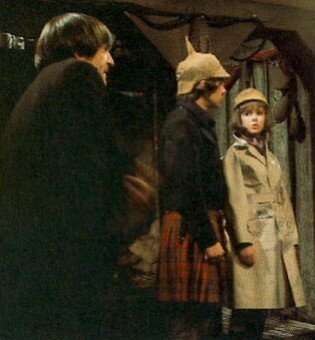50 Glorious Years: Episode 7 - 1969

1969 was such a special year for Doctor Who because it was the end of many eras. It saw the end of Patrick Troughton’s tenure as the Doctor, the end of Jamie (who to this day has appeared in more episodes as a companion than any other) as a regular as well as Zoe. (All three are pictured here in a rare colour photo from The War Games). It was the end of Doctor Who in the 1960’s, the end of black and white Doctor Who and the last time Doctor Who would have seasons that were 40-plus episodes long. With a move to 25 episodes and colour starting in 1970, Doctor Who was off the air for six months after the conclusion of the ten-part The War Games, the longest time by far that it had been off the air since its inception. It was somewhat ironic then that a series that was featuring more and more spaceflight within the narrative of its episodes in light of the Apollo 11 moon landing zeitgeist would take its longest-to-date break at around the same time.
Doctor Who had done six seasons, and with the ratings having dwindled in its sixth season and all of its stars moving on, most shows would and should have ended. Not Doctor Who however. It is somewhat amazing that the show pressed on into a new decade and a new era with a 7th season and a new Doctor. It is often noted that the only reason why the series continued is that the BBC couldn’t think of anything else to replace it with (Barry Letts idea for “Snowy Black”, a series which was akin what Crocodile Dundee would later become, was waiting in the wings however if Season 7 had failed) - in terms of providing the same kind of programming and need for the market. But surely that suggests how truly special and irreplaceable Doctor Who is - here was a series that you could do more and more stories with, and with a cast you could always change if needed. The possibilities were (and 43 years later still are) endless. When the BBC tried to cancel Doctor Who in 1985 and eventually succeeded in 1989, it is notable that they didn’t replace Doctor Who with another sci-fi or family series. The type of programming that Doctor Who provided wasn’t wanted by the BBC brass at the time (which is why they tried so hard to get rid of it) and it vanished completely (really, until the show came back again) - but if you do want a science-fiction series that the appeals to the whole family, there’s nothing better that can exist. This is why Doctor Who barely missed a heartbeat between 1969 and 1970 and came back the following year as though it has never been away. But we’ll get to more of that with our next entry…...
Posted by Luca on Sunday, February 17 at 9:05 am




Post a comment